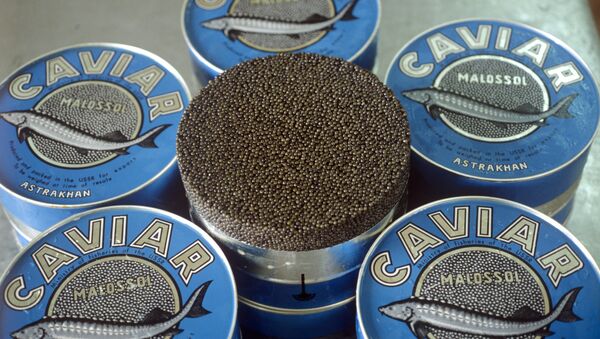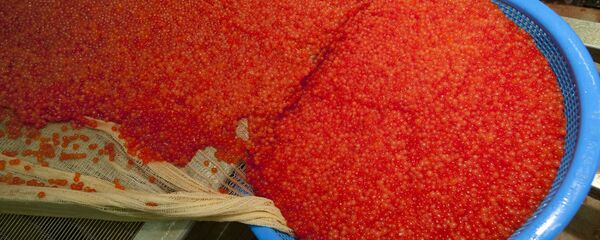MOSCOW, January 8 (Sputnik) — Russia's Federal Fisheries Agency has been presented with a series of proposals aimed at the protection of the country's sturgeon population, Rossiyskaya Gazeta has reported.
The proposals were discussed at a conference organized by the Ministry of Fisheries held ahead of the New Year's Holiday and were aimed at combating the production of poached and counterfeit sturgeon-based products. Among the ideas was an initiative to introduce a unified system of labeling sturgeon products, and a system of accounting and control over supplies for the domestic market. The meeting was presided over by professionals in the field, along with representatives of concerned agencies, including the Interior Ministry and the country's Federal Security Service.
At the recent gathering of experts, proposals were made to apply the standards used on the export market to the domestic market as well. Interior Ministry spokesman Andrei Shabalin was quoted by Rossiyskaya Gazeta as saying that "it would make sense to work on the proposed initiative. Our department already has positive experience in the sale of alcoholic beverages. And the existing enforcement measures to restrict the sale of counterfeit products will become even more effective given the prospect of the introduction of a new labeling system."
The conference agreed on the need to establish a working group on the development and implementation of controls over the domestic distribution of sturgeon products, including a universal system for labeling the fish, and the creation of an information and accounting system. Agency Deputy-head Ilya Shestakov instructed the Ministry to develop an action plan in the coming months, Russian information agency Dieta explained.
The sturgeon used for caviar, both for domestic and foreign consumption, is now based almost entirely at about 50 sturgeon farms, with fishing for wild sturgeon almost entirely banned, excepting permits for the indigenous peoples of the Sakha Republic, and in instances where population control is deemed necessary.
According to the Federal Fishing Agencies, inspections carried out over the course of 2014 caught over 4,000 cases of illegal fishing. With this in mind, experts note that the actual number of crimes is likely to be significantly higher, Dieta noted.
The population of sturgeon in the Caspian Sea has declined significantly over the last 30 years, in part due to the construction of hydroelectric dams on the Volga and other rivers in the region, which have deprived sturgeon of the ability to move to spawning areas. After the collapse of the Soviet Union, a boom in illegal sturgeon fishing brought the species to the brink of extinction, its population declining by nearly fifty times over a period of thirty years. Commercial sturgeon fishing was banned in Russia in 2006, with experts noting that the state must now do more to fight against poachers' distribution channels, Rossiyskaya Gazeta explained.
http://sputniknews.com/business/20140307/188185212/Russia-Hikes-Import-Tariffs-for-US-Caviar.html



